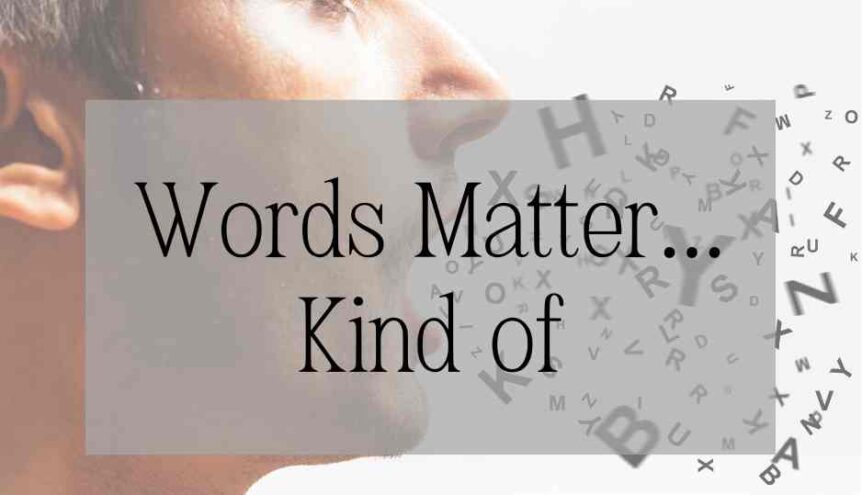 Somewhere around the time my kids were eleven and thirteen, I offered a challenge for them to speak a complete paragraph without using the word like. Every conversation with them was infused with this unnecessary filler word, and it became comical. They took that challenge, and every time they said the word “like” I’d cut them off. “Start over,” I’d say. They’d roll their eyes and start again only to be cut off within seconds. Neither one of them could get further than a sentence or two before “like” snuck into the vocabulary—most often without them even realizing.
Somewhere around the time my kids were eleven and thirteen, I offered a challenge for them to speak a complete paragraph without using the word like. Every conversation with them was infused with this unnecessary filler word, and it became comical. They took that challenge, and every time they said the word “like” I’d cut them off. “Start over,” I’d say. They’d roll their eyes and start again only to be cut off within seconds. Neither one of them could get further than a sentence or two before “like” snuck into the vocabulary—most often without them even realizing.
We all have our “likes.” A friend of Chris’s says, “you know” in place of commas when he’s talking, and one of our California neighbors (who grew up in Ohio) ends most every sentence with, “an’ that.” I have never heard anyone else use this phrasing, and I’m not even sure what it means.
Chris’s filler phrase is, “kind of.”
“I thought I’d kind of mow the grass this afternoon,” he said one day.
“You’re going to kind of mow the grass? What does that mean, exactly?” I asked.
This became a thing with us. “I’m going to kind of clean out the garage” or “I’m going to kind of pack up the car for our trip.” And my response is always the same. “You’re going to kind of do it or really do it?” In case you’re feeling sorry for my husband, know that he loves to correct my grammar. He says it’s his duty as my spouse to keep me sharp for writing. This is me giving a little payback.
We have a new pastor coming on board at our church, and we’re ecstatic. He’s younger than my kids, but he’s experienced, highly educated, and (most important) a teacher of the Word of God. None of that tickling the ears for him.
When he came to town to preach for his “audition” a couple of weeks ago, we invited him and his family to stay with us rather than book a hotel room. This was a sweet time, and it gave us a chance to talk extensively with him about his journey.
“My lead pastor told me I should record my sermons so I could listen and learn,” he told us. “I can’t tell you how embarrassed I was when I realized how often I said, ‘um…’ or ‘uh…’ in the span of one message.”
I feel his pain. When I went back to school as an adult to get my bachelor’s and teaching credentials, I was required to give a 15-minute talk as part of my final for each of my 24 classes. I learned in that very first course how important it was to be articulate when speaking. My teacher knocked off points for every “uh” or “um.” Sadly, I was unaware that would be the case until after I received a less-than-stellar grade. It probably wouldn’t have made a difference, though, because I didn’t even realize I was using these filler words.
My daughter has outgrown using “like” as her filler, for which I’m grateful. However, she has a habit of infusing her conversations with, “to be perfectly honest.” She was scheduled for a job interview a couple of years ago, and Chris offered to give her a practice interview to help her gain a little confidence.
Many of the questions he asked, she included the phrase “to be perfectly honest” in the context of her answer.
“Should I assume if you don’t tag your answer with ‘to be perfectly honest,’ you aren’t being truthful in your other answers?” he asked her.
“No, of course not. I’m always truthful.”
“Then you don’t need to point it out. I’m going to trust you’re telling the truth,” Chris said.
Nikki no longer uses this phrase—especially in a job interview.
Authentic dialogue is an important component of writing fiction. Readers want to feel as if the conversation between characters is true and real—that they’re right there with them in the story. There is an added challenge to writing authentic Southern dialect without it sounding like a parody.
I upset one reviewer because she thought I was making southerners sound uneducated. The reality is most people today do not use correct grammar. “She and I” are a thing of the past. Now it’s “Me and her.” A lot of people say, “I seen” instead of “I saw.” I cringe just typing this. It’s not uneducated—it’s human nature.
I actually love the way southerners speak. I love the way they drop their g’s, the smooth drawl, and the quaint words. And the phrasing can be downright hysterical. I can easily infuse my books with Southern charm, but if I were to write dialogue exactly as people speak it, the only thing I’d accomplish would be to increase my word count. I’d lose my fans, like, instantly. Or maybe I’d kind of lose my fans. To be perfectly honest.






